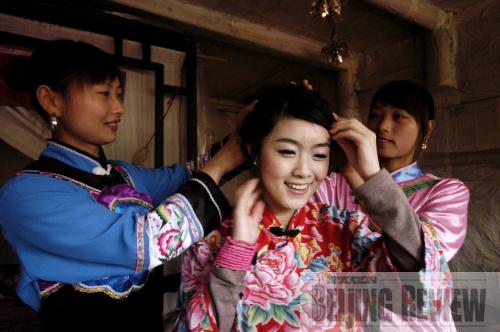|
 |
|
TRADITIONAL WEDDING: A tourist (middle) experiences the wedding customs of the Tujia ethnic group in Yunshe Village on April 25 (CHENG JIE) |
A small clear stream flows past spacious wooden homes and through the village of Yunshe throughout the year. The idyllic village, set among the hills of Jiangkou County, Guizhou Province, is home to 1,800 residents of the Tujia ethnic group, many of whom share the same family name.
The stream that runs through the village originates in the hills, and locals prize a special fish living in its pristine waters. Villagers say the fish is very tasty and can only be served to distinguished guests.
Yunshe has been working over recent years to develop into a tourism destination and become the "No. 1 Village" of the Tujia ethnic group.
When visitors arrive, they are greeted by a group of villagers dressed in traditional garb. Guests are invited to drink local wine.
"The size of the village and the preserved ethnic culture here make it worthy of the name 'No. 1 Village of the Tujia ethnic group,'" said Yang Yunguo, Party Secretary of Yunshe Village.
Guizhou Province, located in China's west, lags behind many of the country's other provinces and autonomous regions in terms of economic growth. But a benefit to this weak economy is that Guizhou boasts one of the most undisturbed environments in China. Healthy surroundings combined with the special ethnic culture makes for a magical place with a high tourism development potential.
Guizhou's ethnic Tujia people comprise 39 percent of the province's 39.75 million inhabitants. All of China's 56 ethnic groups are represented in the area, which leads to a very colorful cultural tapestry. With unspoiled scenery and a strong and diverse minority presence, the area's villages are becoming more and more popular among tourists.
The community was quiet for a time, as many residents left to work in more developed cities. But things have changed in recent years. More and more people have come back since a sense of hope over the strengthening tourism industry has lifted residents' spirits.
In 2005, 39-year-old Deng Heping started a small inn to offer lodging to visitors. it now has 14 beds. She charges 20 yuan ($2.93) per night for each bed. Guests normally spend about 50 yuan ($7.32) each day including meals, she said.
As an economically minded woman, Deng leads a relatively good life in Yunshe, but she is still not satisfied.
"There are a lot of things that I want to do, such as enlarging the scale of the inn and improving the accommodations, but the deficiency of funds is a big problem," said Deng.
Besides being a motivated businesswoman, she is also a good singer. To make more money, Deng organized a performance group to provide entertainment to her guests. There are now more than 30 members in the group, all of them women. They practice in their spare time.
Deng goes onstage during every performance. "We keep part of the income to the inn and divide the rest among the group members. Normally each of us can earn 20 to 30 yuan ($4.39) every time we perform," said Deng.
Party Secretary Yang said the village is planning to build a 6.7-hectare agricultural sightseeing area.
"We plan to further explore the culture of the Tujia ethnic group and develop village tourism," said Yang. In order to bring in more money, he said, his village would work with private companies to accelerate tourism industry development. For the time being, villagers are developing a market for their traditional clothes and crafts.
Yang said tourism has already brought economic benefits to the village. The average income of villagers was 1,570 yuan ($230) in 2002. Income reached 3,150 yuan ($461) in 2008.
More than 30,000 tourists visited in 2008 and, according to Yang, the number will exceed 60,000 in 2009. In the next three to five years, Yunshe Village will host at least six large tourist groups each day, with 200 guests staying overnight and spending from 40 yuan ($5.85) to 60 yuan ($8.78) per person.
"Although there is a lot of work involved, it is the goal that we are pursuing and it needs the efforts of several generations to reach the goal," said Yang. | 